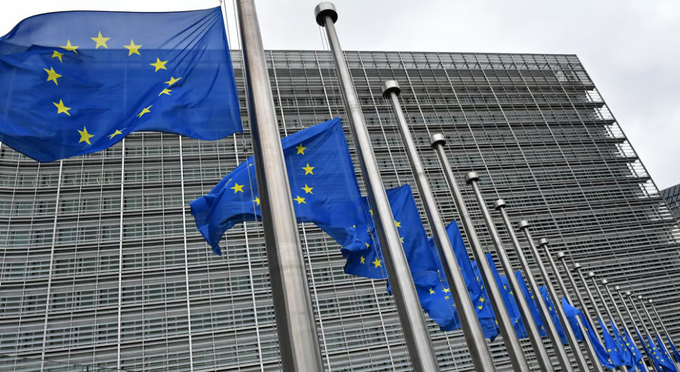November 28, 2025 | 01:03 GMT +7
November 28, 2025 | 01:03 GMT +7
Hotline: 0913.378.918
November 28, 2025 | 01:03 GMT +7
Hotline: 0913.378.918

"We just found an agreement on the biggest climate law ever negotiated in Europe," said German MEP Peter Liese. Photo: AFP via Getty images
A major overhaul of the bloc’s flagship carbon market and a brand new fund to protect vulnerable people from rising CO2 costs were agreed on by EU negotiators in the early hours of Sunday as part of a “jumbo” trilogue that started on Friday morning.
“After 30 hours of (net!) negotiation time we have an agreement about a new ETS and the creation of a social climate fund (SCF),” tweeted Esther de Lange, vice chair of the European People's Party and a key climate lawmaker.
Touted as the cornerstone of Europe’s climate efforts, reforming the Emissions Trading System (ETS) is key to achieving the goal of slashing 55 percent of CO2 emissions by 2030 from 1990 levels.
"We just found an agreement on the biggest climate law ever negotiated in Europe," said German MEP Peter Liese, who steered the negotiations on the bill.
As part of the hard-fought compromise, EU brokers stipulated that power generators and heavy polluters covered by the ETS will have to curb their pollution by 62 percent by the end of the decade, 1 percent more than what the European Commission had initially proposed.
Waste will be covered by the scheme from 2028, with potential derogations until 2030.
The deal also mandates that all the revenues generated by the carbon market "shall" be spent on climate action.
"That's one of the biggest wins of the Parliament," Liese told a briefing held shortly after the end of the talks.
Free CO2 certificates, given to industry to remain competitive against rivals from outside the bloc, will be phased out entirely by 2034 as a planned Carbon Border Adjustment Mechanism is due to enter into force from 2026 at the end of a three-year transition period. The Commission and the Council sought an end-date of 2036, while the Parliament fought for a speedier phaseout by 2032.
The border tax covers cement, aluminum, fertilizers, electric energy production, hydrogen, iron and steel.
However, negotiators stopped short of introducing rebates to protect exports, arguing they would have proven incompatible with World Trade Organization rules. Instead, the EU's 27 nations will be granted the right to ring-fence revenues to support companies at risk of being harmed by the phaseout of free permits.
The deal also calls for a parallel carbon market to cover fossil fuels used to power cars and heat buildings from 2027 — easily one of the most controversial elements due to worries that it could increase energy poverty and unleash political turmoil if not designed in a just way.
To reach a deal, Parliament dropped its call for a split between commercial users and private owners — something the Commission and Council had called unworkable.
But to make it more palatable, policymakers agreed the so-called ETS2 would come with an emergency brake to be triggered in the event carbon prices per ton exceed €90 — which would cause the start to be delayed by one year. The pact also foresees that prices will be capped at €45 at least until 2030.
To help low-income households swiftly shift to cleaner forms of transport and heating so that they won't be unfairly hit by the measure, EU policymakers signed off on a Social Climate Fund worth €86.7 billion running from 2026 until 2032.
That's much larger than the €59 billion fund supported by the Council; 25 percent will be raised through co-financing by EU governments while a so-called "all fuels approach" covering process emissions means more CO2 permits will be sold under the scheme.
Several negotiators said the talks were made particularly tough by Germany's foot-dragging.
"Germany desperately wanted the second carbon market and the inclusion of other fuels. They got it and they should celebrate," said Liese, adding that, "instead of celebrating, they created problems until the last minute."
The agreement also confirmed that the ETS will be extended to the shipping sector.
(Politico)

(VAN) A new study reveals how the simultaneous effects of ocean acidification, salinity and loss of oxygen are making the world more fragile.

(VAN) Hopes are growing that the creation of the first 3D turkey gut model could be a turning point in the battle against the virulent blackhead disease.

(VAN) Tyson, America’s biggest meat supplier, plans to shutter one of its largest beef processing plants as the industry continues to struggle with low cattle supplies and political pressure from Washington.

(VAN) New FAO study shows how digital solutions are empowering farmers and fishers to prevent losses and build resilient agrifood systems.

(VAN) Brazil's COP30 presidency pushed through a compromise climate deal on Saturday that would boost finance for poor nations coping with global warming but that omitted any mention of the fossil fuels driving it.

(VAN) Poultry farmers in the UK have been warned that they could face one of the worst winters yet for bird flu.

(VAN) Prices of main-crop paddy have risen sharply, with jasmine rice hitting 16,100 baht per tonne — the highest level in years.